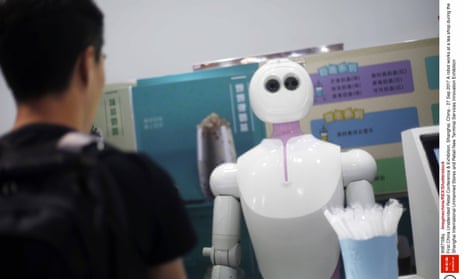Hal Varian, chief economist at Google, has a simple way to predict the future. The future is simply what rich people have today. The rich have chauffeurs. In the future, we will have driverless cars that chauffeur us all around. The rich have private bankers. In the future, we will all have robo-bankers.
One thing that we imagine that the rich have today are lives of leisure. So will our future be one in which we too have lives of leisure, and the machines are taking the sweat? We will be able to spend our time on more important things than simply feeding and housing ourselves?
Let’s turn to another chief economist. Andy Haldane is chief economist at the Bank of England. In November 2015, he predicted that 15 million jobs in the UK, roughly half of all jobs, were under threat from automation. You’d hope he knew what he was talking about.
And he’s not the only one making dire predictions. Politicians. Bankers. Industrialists. They’re all saying a similar thing.
“We need urgently to face the challenge of automation, robotics that could make so much of contemporary work redundant”, Jeremy Corbyn at the Labour Party Conference in September 2017.
“World Bank data has predicted that the proportion of jobs threatened by automation in India is 69 percent, 77 percent in China and as high as 85 percent in Ethiopia”, according to World Bank president Jim Yong Kim in 2016.
It really does sound like we might be facing the end of work as we know it.
Many of these fears can be traced back to a 2013 study from the University of Oxford. This made a much quoted prediction that 47% of jobs in the US were under threat of automation in the next two decades. Other more recent and detailed studies have made similar dramatic predictions.
Now, there’s a lot to criticize in the Oxford study. From a technical perspective, some of report’s predictions are clearly wrong. The report gives a 94% probability that bicycle repair person will be automated in the next two decades. And, as someone trying to build that future, I can reassure any bicycle repair person that there is zero chance that we will automate even small parts of your job anytime soon. The truth of the matter is no one has any real idea of the number of jobs at risk.
Even if we have as many as 47% of jobs automated, this won’t translate into 47% unemployment. One reason is that we might just work a shorter week. That was the case in the Industrial Revolution. Before the Industrial Revolution, many worked 60 hours per week. After the Industrial Revolution, work reduced to around 40 hours per week. The same could happen with the unfolding AI Revolution.
Another reason that 47% automation won’t translate into 47% unemployment is that all technologies create new jobs as well as destroy them. That’s been the case in the past, and we have no reason to suppose that it won’t be the case in the future. There is, however, no fundamental law of economics that requires the same number of jobs to be created as destroyed. In the past, more jobs were created than destroyed but it doesn’t have to be so in the future.
In the Industrial Revolution, machines took over many of the physical tasks we used to do. But we humans were still left with all the cognitive tasks. This time, as machines start to take on many of the cognitive tasks too, there’s the worrying question: what is left for us humans?
Some of my colleagues suggest there will be plenty of new jobs like robot repair person. I am entirely unconvinced by such claims. The thousands of people who used to paint and weld in most of our car factories got replaced by only a couple of robot repair people.
No, the new jobs will have to be doing jobs where either humans excel or where we choose not to have machines. But here’s the contradiction. In fifty to hundred years time, machines will be super-human. So it’s hard to imagine of any job where humans will remain better than the machines. This means the only jobs left will be those where we prefer humans to do them.
The AI Revolution then will be about rediscovering the things that make us human. Technically, machines will have become amazing artists. They will be able to write music to rival Bach, and paintings to match Picasso. But we’ll still prefer works produced by human artists.
These works will speak to the human experience. We will appreciate a human artist who speaks about love because we have this in common. No machine will truly experience love like we do.
As well as the artistic, there will be a re-appreciation of the artisan. Indeed, we see the beginnings of this already in hipster culture. We will appreciate more and more those things made by the human hand. Mass-produced goods made by machine will become cheap. But items made by hand will be rare and increasingly valuable.
Finally as social animals, we will also increasingly appreciate and value social interactions with other humans. So the most important human traits will be our social and emotional intelligence, as well as our artistic and artisan skills. The irony is that our technological future will not be about technology but all about our humanity.
Toby Walsh is Professor of Artificial Intelligence at the University of New South Wales, in Sydney, Australia. His new book, “Android Dreams: the past, present and future of Artificial Intelligence” was published in the UK by Hurst Publishers in September 2017. It’s available from the Guardian Bookshop. You can read more at his blog, http://thefutureofai.blogspot.com/
